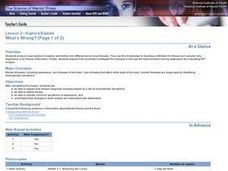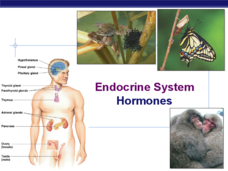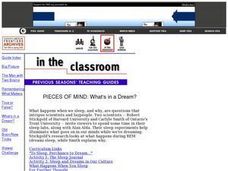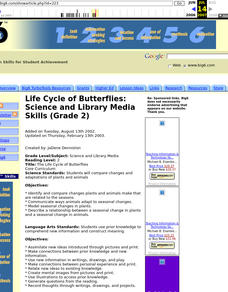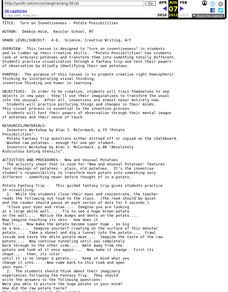Curated OER
What's Wrong?
Students analyze case studies to explore similarities and differences among illnesses. PET images are examined to explore how scientists investigate the changes in the way the brain functions during depression.
Curated OER
Treatment Works!
Students consider the goals of a treatment plan for persons who have had the way they think, feel, or behave changed because of mental illness. PET images are utilized to support the evidence of changes in the activity and functioning of...
Curated OER
Reproduction, Day 2: Pregnancy
Nearly all students have seen pregnant women and may have questions about human development. Intended for secondary students with mild to moderate mental disabilities, this instructional activity defines the process of pregnancy in...
Curated OER
Endocrine System: Hormones
The many images and labeled diagrams in this PowerPoint will help learners understand different areas of the endocrine system. The slide
show starts with information about the absorption of lipid and protein based hormones, and then...
Curated OER
The Brain: Control Central
Students investigate the brain as the organ that regulates all of their physical, emotional, and cognitive responses. Some of the components of mental illness are examined inn this lesson.
Curated OER
Pieces of Mind: What's In A Dream?
Students explore the five stages of sleep. They view video footage of sleep labs and discuss the findings. Students conduct experiments by keeping a sleep journal to track their sleep and dream activity. They find examples of ways...
Curated OER
Light and Our World
In this science worksheet, students solve a variety of curriculum related puzzles. They also practice basic mental math skills using four operations. The concept of light and color are explored and how it interacts with different objects.
Curated OER
Life Cycle of Butterflies
Students identify ways plants and animals make changes related to the seasons, specifically focusing on the life cycle of butterflies.
Curated OER
Turn on Inventiveness
Students practice visualization through a fantasy trip and test their powers of observation by blindly identifying their own potatoes.
